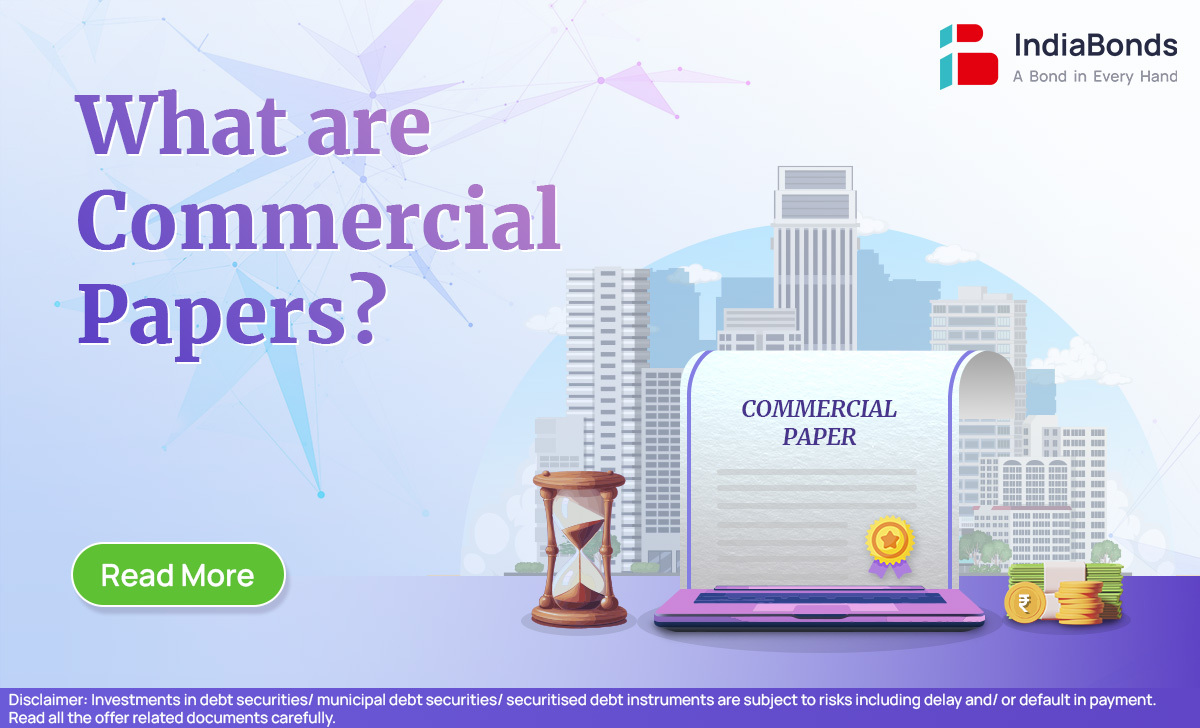What are Commercial Papers?

Introduction
Businesses often find themselves needing quick, short-term funding to keep things running smoothly, whether it’s managing daily operations, buying inventory, or bridging gaps between receivables and payables. In these situations, having immediate access to funds is crucial. One effective tool for meeting these short-term financial needs is commercial paper. In this article, we’ll break down what commercial paper is, how it works, its pros and cons, and what it means for investors.
What is Commercial Paper?
Commercial paper (CP) is an unsecured, short-term money market instrument issued by companies, financial institutions, and other eligible entities to meet short-term immediate financial needs. It’s typically used to finance working capital requirements, giving businesses the flexibility to manage cash flow without turning to more expensive or complicated borrowing options. CPs offer a cost-effective way to keep operations running smoothly without disrupting the company’s financial stability.
Features of Commercial Paper
Discounted Issuance: CPs are usually sold at a discount to their face value. Investors buy them at a lower price and receive the full face value at maturity, making them an attractive short-term investment.
Issuance and Denominations: CPs are typically issued in denominations of Rs. 5 lakh and multiples thereof, with a minimum investment of Rs. 5 lakh required.
Short-Term Maturity: The maturity of a CP ranges from 7 days to a year, making them ideal for immediate financial needs.
Regulatory Framework: In India, CP issuance is governed by the Reserve Bank of India (RBI). Only financially sound companies that meet certain criteria, like a minimum net worth of Rs. 4 crores and a credit rating of at least ‘A3’ from a SEBI-registered credit rating agency, can issue CPs. These regulations help protect investors and maintain market integrity.
Dematerialized Form: CPs are issued in digital form, making them easy to trade in the secondary market, which adds liquidity for investors.
Tradability: These instruments can be easily traded in the secondary market, allowing investors to exit their positions before maturity if needed.
Example of Commercial Paper
Here’s a simple example: Suppose a company needs to finance its inventory purchases before the festive season. Instead of taking out a bank loan, the company issues CPs worth Rs. 50 lakh, maturing in 90 days. Investors buy these CPs at a discount, say for Rs. 48 lakh, and at maturity, they receive the full Rs. 50 lakh, earning a nice return. This allows the company to efficiently manage its short-term liquidity without paying high-interest rates.
Advantages and Disadvantages of Investing in Commercial Paper
Advantages:
Cost-Effective: CPs generally offer lower interest rates compared to traditional borrowing methods, making them attractive for issuers.
Liquidity: CPs are easily traded in the secondary market, providing liquidity for investors.
Flexibility: Issuers can quickly raise funds to meet short-term financial needs.
Disadvantages:
Credit Risk: Being unsecured, CPs carry a higher risk of default compared to secured instruments.
Market Dependence: The ability to issue CPs relies heavily on favorable market conditions and investor interest.




The Perspective of Retail Investors
Commercial papers have traditionally been the domain of institutional investors like mutual funds, insurance companies, and pension funds due to the high minimum investment requirement—typically Rs. 5 lakh or more. But in recent years, retail investors have shown growing interest in CPs as a short-term investment option. For retail investors, CPs offer a chance to diversify their portfolios with a relatively flexible debt instrument. While the high minimum investment might be a barrier for some, those with substantial capital can enjoy decent returns. However, it’s important to remember that CPs are unsecured, so investors need to carefully consider the credit rating and financial health of the issuing company before investing.
Conclusion
On January 4, 2024, the RBI introduced new guidelines to improve transparency in the CP market. Issuers must now specify the exact use of the funds raised, allowing investors to make more informed decisions. This move aims to reduce risks and ensure that the funds are used for legitimate business purposes, further strengthening the market’s reliability. Commercial papers are a vital part of the money market, offering companies a flexible, cost-effective way to manage short-term funding needs, especially for working capital. The recent RBI guidelines have made the CP market even more attractive for both institutional and retail investors. But like any investment, it’s important to weigh the risks and benefits before diving in. Make sure the CP aligns with your financial goals, risk tolerance, and investment horizon. Conduct thorough research and understand the creditworthiness of the issuer before investing in commercial papers.
FAQs
Q. What is the difference between commercial paper and a certificate of deposit?
A. Commercial paper is an unsecured promissory note issued by companies to meet short-term liabilities, while a certificate of deposit (CD) is a time deposit offered by banks, providing a fixed interest return at maturity. Financial institutions in India can issue both commercial papers and certificates of deposit. Banks can issue CDs but not commercial papers, which can only be issued by businesses.
Q. Who are the typical investors in commercial papers?
A. Commercial papers are typically purchased by institutional investors such as mutual funds, insurance companies, pension funds, and banks. Individual investors with significant capital may also invest in CPs, provided they can meet the minimum investment requirements, which are generally set at INR 5 lakh or higher.
Q. How are commercial papers rated?
A. Commercial papers must be rated by a SEBI-registered credit rating agency. The minimum credit rating for a CP to be issued is ‘A3’ according to the rating symbols and definitions prescribed by SEBI.
Disclaimer: Investments in debt securities/ municipal debt securities/ securitised debt instruments are subject to risks including delay and/ or default in payment. Read all the offer related documents carefully.
















































